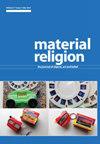Reformation of the Senses: The Paradox of Religious Belief and Practice in Germany
IF 0.4
3区 哲学
0 RELIGION
引用次数: 0
Abstract
Along with the analysis of religious publicity, I want to highlight two other dimensions of Oliphant’s work that material religion scholars across disciplines will find fruitful. First, four Chapters 3–6 respectively take up the Collège’s initial four art exhibitions. While the voices of artists and Collège personnel are integrated, these chapters are primarily focused on visitors’ receptions of the exhibits. Oliphant’s fieldwork entailed her volunteering as a docent for the exhibitions, which meant she was uniquely positioned to constantly interact with visitors and observe their interactions with the art and the building’s architecture. Material religion studies of tourism, pilgrimage, and museums always confront the question of how best to account for visitors’ engagements with place and onsite materialities. Oliphant’s methodology provides a useful model. Her access to visitors as a docent and patterned documentation of visitor practices figure centrally in the book’s argument. She learned that despite the Collège’s intentions toward inclusivity, programming ultimately catered to an elite demographic of Parisians who often appear more interested in re-creating Catholicism’s privileged banality than taking up artists’ challenges to critically reflect on identity, inequality, and exclusion. A second dimension closely observed by Oliphant is the treatment of the Collège building as an actor. New materialist theories mark a significant development among material religion scholars, attuning us to the agentive capacities of non-human entities and assemblages of networked relationships. Throughout the book, we encounter multiple kinds of actors who invest the historic monastic space with notable force of being. Founders, docents, artists, and visitors each celebrate the building as a powerful entity, as something intrinsically enchanting and valuable. Oliphant moves beyond the fact of these commitments to ask how such claims of material agency buttress the broader exclusionary politics being reproduced by the Collège. In her analysis, when people highlight the building as an agentive force they reflect and re-create a problematic insistence on valorizing the medieval past over and against France’s multicultural present. Studies of religious publicity have deservingly become a primary area of inquiry within and beyond the field of material religion. As religious actors, traditions, and materialities enter and occupy public life, we are continually reminded of why religion is an immense cultural force and why the critical study of religion is necessary for understanding matters of belonging, sociality, power, and change. The Privilege of Being Banal makes a distinctive contribution to this comparative scholarship, posing pressing questions about how the social power of religion operates and how religious heritage is negotiated. The positive imprint of Oliphant’s book will reach far beyond anthropologies of western Europe, secularism, and Catholicism, benefiting anyone interested in the dynamics of religious publicity.观念的变革:德国宗教信仰与实践的悖论
在分析宗教宣传的同时,我想强调奥列芬特作品的另外两个维度,跨学科的物质宗教学者会发现这些维度富有成效。首先,第3章至第6章分别介绍了Collège最初的四个艺术展览。艺术家和Collège工作人员的声音融合在一起,这些章节主要集中在游客对展品的接待上。奥列芬特的实地考察使她自愿担任展览的讲解员,这意味着她处于独特的位置,能够不断与游客互动,观察他们与艺术和建筑的互动。旅游、朝圣和博物馆的物质宗教研究总是面临着如何最好地解释游客对场所和现场物质的参与的问题。奥列芬特的方法论提供了一个有用的模型。她以讲解员的身份接触访客,并对访客实践进行了模式化的记录,这是本书的核心论点。她了解到,尽管Collège的意图是包容性,但节目最终迎合了巴黎的精英人群,他们似乎更感兴趣的是重塑天主教的特权平庸,而不是接受艺术家的挑战,批判性地反思身份、不平等和排斥。奥列芬特密切关注的第二个维度是作为演员对待Collège大楼的方式。新唯物主义理论标志着物质宗教学者的重大发展,使我们关注非人类实体的代理能力和网络关系的组合。在整本书中,我们遇到了各种各样的演员,他们以显著的存在力投资于历史悠久的修道院空间。创始人、讲解员、艺术家和游客都将这座建筑视为一个强大的实体,视为一种内在迷人和有价值的东西。奥列芬特超越了这些承诺的事实,询问这种物质代理的说法是如何支持Collège再现的更广泛的排斥政治的。在她的分析中,当人们强调这座建筑是一种能动的力量时,他们反思并重新创造了一种有问题的坚持,即将中世纪的过去与法国的多元文化现状相抗衡。宗教宣传研究理所当然地成为物质宗教领域内外的主要研究领域。随着宗教行动者、传统和物质进入并占据公共生活,我们不断被提醒,为什么宗教是一股巨大的文化力量,为什么对宗教的批判性研究对于理解归属、社会性、权力和变革问题是必要的。Banal的特权对这一比较学术做出了独特的贡献,提出了关于宗教的社会力量如何运作以及宗教遗产如何谈判的紧迫问题。奥列芬特这本书的正面影响将远远超出西欧人类学、世俗主义和天主教,任何对宗教宣传动态感兴趣的人都将受益。
本文章由计算机程序翻译,如有差异,请以英文原文为准。
求助全文
约1分钟内获得全文
求助全文

 求助内容:
求助内容: 应助结果提醒方式:
应助结果提醒方式:


